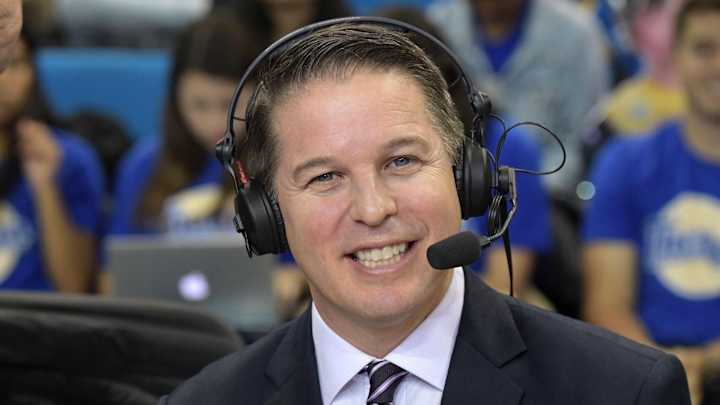Hey, Roxy Bernstein, What Does a Sports Broadcaster Do When There Are No Sports?

What does a sports broadcaster do when there are no sports?
“I never have been home this much in my life,” says Roxy Bernstein, a 1997 Cal grad who calls games for Major League baseball along with college football and basketball. “Now my wife is probably, `Don’t you have somewhere to go? I’ve been home since March 12. I’ve never been home for this stretch ever in my life.”
Roxy says he enjoying having more time to spend with his two kids. And he believes his wife liked having him around the house . . . to a point. “She’s probably sick of me now.”
But this season of the coronavirus is surreal, he concedes.
“It’s weird,” Roxy says. “It’s bizarre not working, not traveling, not driving across the Bay to the Coliseum, not being able to turn on a game . . . at least a current game, on television.”
Roxy’s baseball season was scheduled to start with an Opening Day game in Houston between the Astros and Angels on March 26. That was scrubbed. He always gets a Fourth of July game for ESPN radio. That’s canceled.
“I have nothing on my calendar.”
Baseball will return in late July, with a dramatically shortened 60-game schedule. That finally happened after weeks of bickering over money between millionaire players and billionaire owners that left some baseball fans with a bad taste in their mouths, given what is happening in the world.
Roxy says he felt worst for others impacted by the shutdown, such as front-office workers, stadium employees, minor leaguers, anyone who was furloughed. “I feel awful for them,” he says.
Roxy does about 20 A’s games each year, and says the team will have to reverse its recent habit of starting slowly and building momentum over a long, 162-game stretch. He points out that the Washington Nationals were 19-31 through 50 games last year before recovering and ultimately winning the World Series.
“Sixty games puts the urgency on every game,” he says. “The way I’m looking at it is it’s a marathon, but we’re starting on the 21st mile.”
For Cal fans, the more urgent question is whether we will have a college football season?
It’s clear Bernstein has a mixed mind on the topic. “I’m optimistic but I’m not feeling great about the prospects of playing in the fall,” he says.
He is confident that conference commissioners are talking on a regular basis, sharing ideas and tweaking plans in response to the COVID-19 pandemic. Athletic directors and university presidents are part of those conversations. All options are being considered, Roxy believes.
“The (full existing) schedule that’s laid out there that they’re hoping to go with, might not be what we see,” he says. “You’ve heard different scenarios . . . whether it’s this schedule, whether it’s conference games only, whether it’s a shortened season. The Ivy League recently has come out and said, `We’re probably going to push things to the spring and play football then.’ “
The foreign concept of Pac-12 football in the spring certainly sounds far-fetched, but Bernstein suggests that if the college football braintrust is convinced that’s the best opportunity to start and finish a season, we could see it.
“They know what’s at stake in terms of the revenue. If it’s safer to play in the spring . . . they may go that route,” he says. "I just hope we have football.”
TOMORROW: Roxy Bernstein on the 2020 Cal football team
.
Follow Jeff Faraudo of Cal Sports Report on Twitter: @jefffaraudo
Click the "follow" button in the top right corner to join the conversation on Cal Sports Report on SI. Access and comment on featured stories and start your own conversations and post external links on our community page.

Jeff Faraudo was a sports writer for Bay Area daily newspapers since he was 17 years old, and was the Oakland Tribune's Cal beat writer for 24 years. He covered eight Final Fours, four NBA Finals and four Summer Olympics.